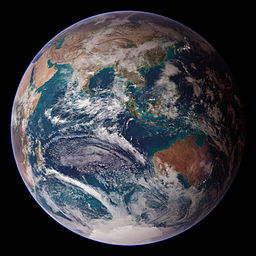Road to Paris: Come, renew the face of the earth
The UN Climate Summit in Paris will be an unprecedented opportunity for nearly 200 nations to take bold action on the care for the earth and for all people suffering the adverse effects of climate change.
The UN Climate Summit in Paris will be an unprecedented opportunity for nearly 200 nations to take bold action on the care for the earth and for all people suffering the adverse effects of climate change. The following article, published in the November-December 2015 NewsNotes, was written by Chloe Schwabe, MOGC Faith-Economy-Ecology project coordinator.
What an exciting moment we are living in! From the summer launch of Pope Francis’ encyclical Laudato Si’; the pope’s visit to the U.S. during which he highlighted the need for climate action, peace, and care for migrants; the completion of the UN Sustainable Development Goals; and the upcoming UN Climate Summit in Paris, we feel a renewed sense of hope for the Church and our whole earth community.
The challenge before us is great. The shift from a “throwaway culture” to a “culture of care” will take personal sacrifice and structural changes. “Many things have to change course, but it is we human beings above all who need to change,” Pope Francis writes in Laudato Si’. “We lack an awareness of our common origin, of our mutual belonging, and of a future to be shared with everyone. This basic awareness would enable the development of new convictions, attitudes and forms of life. A great cultural, spiritual, and educational challenge stands before us, and it will demand that we set out on the long path of renewal.”
Maryknoll Missioners are committed to challenging themselves and challenging corporate power, international financial institutions and governments, to change their models of growth and production. We bring the voices of those most affected by climate change and poverty to decision-making tables as we advocate for adaptation funding in climate policy, environmental and social safeguards at the World Bank, or for corporate responsibility at shareholders meetings.
I was reminded about the need for an ecological conversion in my own heart and in our government policies while I was in Peru in October. The first week was spent at the World Bank meetings where, in one room, the Peruvian finance minister spoke positively about his country’s economy (aside from a few problems in the extractives sector). And in another room indigenous people spoke about the environmental and human rights violations caused by a gold mining project supported by World Bank financing in Cajamarca, Peru, site of the Yanacocha mine. One man spoke about getting shot by security forces while protesting the mine. He is now paralyzed and in a wheelchair. A woman, Máxima Acuña de Chaupe, described the harassment that she and her family suffer from the Yanacocha mine security, for refusing to give up their land.
During the second week, I visited the city of Puno where Maryknoll Sister Pat Ryan works with the Center for Human Rights and Environment. The center works to defend the rights of indigenous communities who often may not be aware that that their land has been concessioned for mining. Ever present in the region is a concern for water, which is already scarce and will become scarcer due to climate change, water grabbing by the mining companies, and contamination from the mining processes.
The center leads workshops on the human right to water and the legal rights of indigenous communities, made up of mostly farmers and llama/sheep herders. I met Aymara and Quechua community leaders – many of whom have little to no formal education and live in poverty – who face charges for violence that occurred in 2011 at a protest of the contamination from the Bear Creek mining project, despite the fact that it is unclear who was present and who perpetrated the violence. This is just one example of the increased criminalization of protest, especially in the extractives sector.
The minerals processed and transported in Peru support our way of life in the U.S. They are in our building materials, jewelry, and electronics. The exploitation, extraction, production, and transportation all require energy, most of which is still based on fossil fuels.
In November, MOGC will launch a four- week series Path to Paris. Each week, a two-page guide will examine an adverse impact of climate change and what we can do. Share it with your parish and friends; and use it for personal reflection. Look for it in your email box and find it online at http://www.maryknollogc.org/tag/path-paris. We offer it in response to Pope Francis’ call: “Our goal is not to amass information or to satisfy curiosity, but rather to become painfully aware, to dare to turn what is happening to the world into our own personal suffering and thus to discover what each of us can do about it.” (Laudato Si’ 19)

